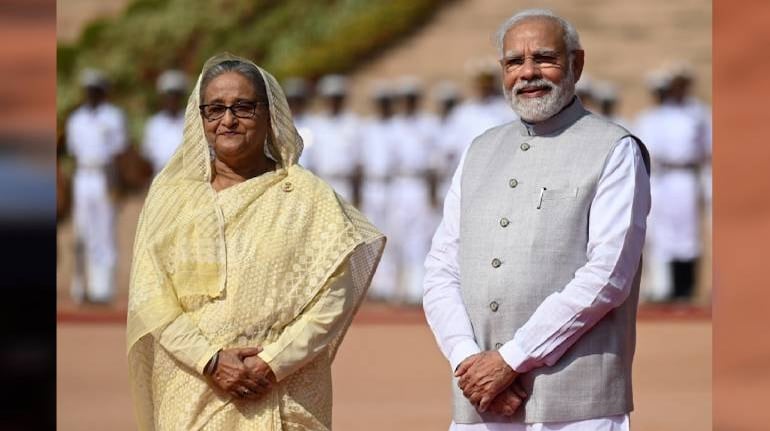



As Bangladesh is showing early signs of imploding, it is imperative for Prime Minister Narendra Modi’s government to step in as a mediator as quickly as possible before things get out of hand in India’s immediate neighbourhood. The United States is already at it, but India simply can’t afford to forget that it is the resident power with onerous duties and responsibilities it can shirk only at its own cost and consequences.
The internal situation next door is worsening after the Sheikh Hasina government’s recent announcement that general elections will be held on January 7. The ruling Awami League and the opposition Bangladesh Nationalist Party-Jamaat e Islami are not merely rival political blocs engaged in innocent electioneering.
Spiralling Violence, UnrestThe two sides are locked in a deadly combat marked by brutal killings in police firing, mass arrests, general strikes and rail-road-waterway blockades over BNP-JeI’s demands for establishing a neutral caretaker government to supervise the upcoming polls. Airports, or at least roads leading to airports, could also soon turn into battlegrounds plunging the country deeper into chaos and anarchy.
Compounding the increasingly dangerous political deadlock are nationwide clashes between the workers of the garment industry – which accounts for about 80 percent of annual exports of US$ 55 billion and as much as 16 percent of gross domestic product – and the police-paramilitary over abysmally low wages. On top of that, dengue has claimed nearly 2,000 lives, underlining the despair and volatility gripping the densely populated nation which hasn’t had a regime change in 15 long years.
As all channels of communication between the government and the opposition have broken down, India can be the third party to bring AL and BNP-JeI to the negotiating table to end the spiral of violence and usher in peace. In fact, India must also come forward to mediate in the garment industry’s dispute over pay rise which the Hasina administration says is being instigated by the BNP – which, in turn, blames Hasina’s blatantly pro-factory owners’ approach and use of brute force against predominantly female protestors for the impasse.
Bangladesh’s Proximity To IndiaBangladesh is far too important for India to pursue a hands-off policy at this critical juncture ahead of parliamentary polls there. It is not just another neighbouring country like Pakistan, Nepal, Bhutan or Sri Lanka – it’s a lot more than that. Geographically, Bangladesh is well and truly embedded “inside” India.
Save for a short boundary with Myanmar and the waters of the Bay of Bengal in the south, Bangladesh is surrounded by as many as five Indian states – West Bengal, Assam, Meghalaya, Tripura and Mizoram – on all sides. In that sense, Bangladesh is indeed “inside” India – and therefore far more important than a neighbour in the traditional sense.
Bangladesh’s domestic politics and governance naturally impact India more than any other country in the world – and certainly much, much more than the US which is continents and oceans away from Bangladesh.
Unless India steps in, there is a real threat of Bangladesh getting dangerously radicalised because of repressive and oppressive measures unleashed by Hasina against opposition parties. Cadres of opposition political parties driven underground by the state machinery and ruling party hoodlums, are bound to have only jihadi outfits for company and solace.
The resulting nexus forged in the fire of adversity will be a boon for the forces of religious extremism. And nothing in Bangladesh is more inimical to Indian interests than Islamic fundamentalism which has become deadlier under Pakistani direction. In the past, India has been at the receiving end of Pakistan-backed subversion from Bangladeshi soil.
Now, it is in our hands, to nip in the bud the possibility of radicalisation next door by ensuring that cadres of mainstream political parties are not driven into the arms of jihadis. Otherwise, a recurrence of those nightmarish days is inevitable.
Outweighing Others In InfluenceThere is nothing illegitimate or unsavoury about India harnessing its military and economic clout for power projection. If the Modi government had got bogged down by self-doubts, India wouldn’t have been considered as a potential mediator in the Russia-Ukraine war by the international community.
Ultimately, New Delhi was denied the opportunity to play peacemaker because of US opposition to India being given such a key role in the backdrop of the refusal to endorse United Nations Security Council resolutions against Moscow.
Today, a great opportunity beckons India in Bangladesh where it wields more influence than all the Security Council members put together. Although New Delhi is perceived as pro-Hasina, this writer believes the opposition would happily agree to mediation by New Delhi.
The truth is that the Bangladeshi opposition is over eager to talk to India but we have been needlessly rebuffing them so far. As an honest broker, India can now raise its own standing even higher in Bangladesh. Bangladesh’s warring politicians have presented India with a golden opportunity to assert its authority and expand its influence in its zone of influence where both China and America are jockeying for power.
SNM Abdi is an independent journalist specialising in India’s foreign policy and domestic politics. Views are personal, and do not represent the stance of this publication.Discover the latest Business News, Sensex, and Nifty updates. Obtain Personal Finance insights, tax queries, and expert opinions on Moneycontrol or download the Moneycontrol App to stay updated!
Find the best of Al News in one place, specially curated for you every weekend.
Stay on top of the latest tech trends and biggest startup news.